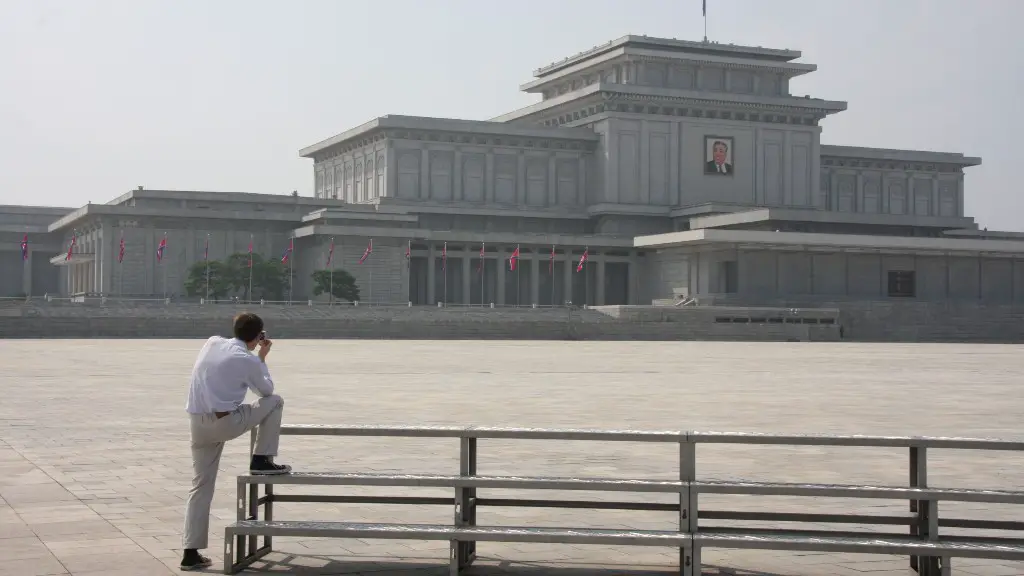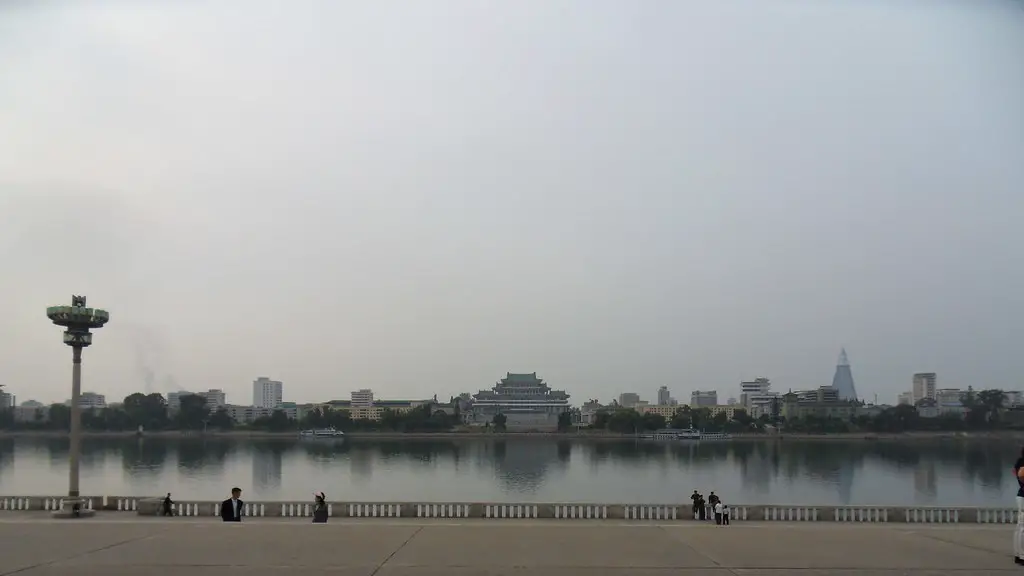North Korea is a mysterious and secretive nation, but its reputation for human rights abuses is well-known worldwide. People suffer from famine, totalitarian rule, and lack of freedom of expression. With little opportunity for growth or improvement, many people risk life and limb to escape. They do so in spite of almost impossible odds, in search of a better life for themselves and their families. But why are people leaving North Korea in the first place?
The reasons for leaving North Korea are political and economic. North Korea is ruled by a paranoid government that exercises complete control over every aspect of its citizens’ lives. It has become increasingly oppressive and restrictive over the years, and its citizens lack personal freedom and the right to participate in their own governance. North Koreans are subjected to severe punishment if they are caught attempting to leave the country. The government also severely restricts access to foreign media, which is viewed as a threat to its authoritarian rule.
The economy in North Korea is in shambles. Decades of mismanagement, international sanctions, and frequent natural disasters have all contributed to the ongoing economic collapse. Many of the country’s population do not have access to basic necessities. Poverty and starvation are common, and the government is unable to provide adequate aid to those who need it most. People have few economic opportunities, and those who are able to leave are doing so in search of work and better living conditions.
Although North Korean society is isolated from the outside world, its population is well aware of the fact that life in other countries is much better than what they have to endure. Many North Koreans have family members who have fled the country, and they can tell horrific stories of what it is like to live in North Korea. This may be one of the main reasons why so many people are willing to risk their lives to leave North Korea, as they are desperate to escape the oppressive regime and the bleak economic conditions.
The process of fleeing North Korea can be dangerous and complicated. The majority of defectors will pass through China before heading to South Korea, but they must first face many risks. North Korean borders are heavily guarded and there are severe penalties for anyone attempting to leave the country. Defectors must also contend with traffickers and smugglers who prey on desperate refugees. Even if they manage to escape safely, defectors may be victims of discrimination in the countries that they escape to. There are also difficulties in finding employment and adapting to the unfamiliar culture.
Despite all of these difficulties, people still choose to leave North Korea, as they believe that the risks are worth it. Many see it as a way to improve their lives, or to stand up for basic human rights. Ultimately, it is a decision between living with oppression or making a bold attempt for freedom.
The Impact on North Korea
The North Korean government views the emigration of its citizens as a serious threat to its power. North Korea has strictly forbidden its citizens from leaving the country, and it has implemented drastic measures to prevent them from doing so. The government’s fear of defection even extends to foreign visitors. North Koreans are not allowed to interact with visitors from other countries, or communicate with them in any way. This level of control results in a very isolated population.
The government also uses the people who flee as propaganda tools. Reports of abuse and mistreatment of North Koreans are typically dismissed as lies or manipulation. North Korea portrays those who flee as selfish and traitorous, and it works hard to control the narrative within its borders. The government also uses the threat of punishment to stop people from leaving, as it is afraid of losing any more of its citizens.
The North Korean government’s attempts to control its citizens’ movements has had far-reaching consequences. Families are often split up, leaving parents unable to send their children to school, or to receive medical care. In addition, North Korea is missing out on the skills and perspectives of its citizens who may have otherwise stayed and contributed to the country’s development.
The Impact on South Korea
South Korea has welcomed North Korean refugees with open arms. Since the end of the Korean War in 1953, South Korea has resettled over 35,000 North Korean refugees. The government provides support for education, employment and healthcare for the new arrivals. South Korea also covers the costs associated with the refugees’ travel and resettlement. In addition, special Korean reunification packages are provided to help former North Koreans to integrate into their new lives.
South Korea’s acceptance of the refugees has had both positive and negative consequences. On the one hand, South Korea has been praised for its humanitarian efforts. It has provided crucial aid to those who need it most, and it has opened its doors to those in need of refuge. On the other hand, some South Koreans feel that the refugees bring with them crime and poverty, and that the government should instead focus its efforts on those already living in South Korea.
South Korea’s response to North Korean refugees is a complex issue, but the country’s efforts have so far been mostly successful. Although the process of integration is not always smooth, many refugees are able to lead successful lives and make positive contributions to South Korean society. In addition, the reunification packages also provide an opportunity for people from both countries to uncover their hidden family connections.
The Impact on the Paliamented International Community
The mass exodus of North Korean refugees has put immense pressure on neighbouring states. As people pour into China and other countries, there are worries about the strain on resources, social unrest, and security. Governments have responded by cracking down on people-smuggling operations and toughening up immigration laws. In some cases, refugees have even been forcibly returned to North Korea, where they face torture, imprisonment, or even death as punishment.
From a broader perspective, the international community has been called upon to help protect North Koreans who flee their country. The United Nations has raised awareness, and called for more support for North Korean refugees. In 2019, the United Nations High Commissioner for Refugees (UNHCR) issued guidance on the protection of North Koreans, with a particular focus on those who flee to China.
International organizations, such as Amnesty International, are also attempting to draw attention to the plight of North Korean refugees. They call for governments and policymakers to take concrete steps to protect these refugees from exploitation and abuse, as well as to ensure that their rights are respected. These organizations argue that the only way for North Koreans to be truly safe is for them to be able to seek asylum without fear of detention or deportation.
The Impact on Individuals
For individuals, the decision to leave North Korea is a difficult one. The risks of being caught by the government or trafficked by smugglers are very real. In addition, the physical and mental strain of escaping the country can have a long-lasting impact on the individuals escaping. Even if they make it to their destination safely, they may still face discrimination and poverty.
However, despite all of these difficulties, people still chose to flee North Korea. For many, it is seen as a means of survival, a way to escape the oppressive regime and its dismal economy. Others may be inspired to take a stand against human rights abuses, or to make a better life for themselves and their families. These courageous individuals are a testament to the human spirit and its capacity to survive and even thrive, even in the face of overwhelming odds.
The Impact on the Region
The mass departure of people from North Korea has also had a profound effect on the region as a whole. Increased tension between North Korea and other countries has resulted in military build-ups near the borders. In addition, the refugee crisis has put pressure on grassroot aid organizations and humanitarian programs, which have been strained by the sudden influx of people.
Furthermore, North Korea’s refusal to accept humanitarian aid means that many of the refugees are going without basic necessities. This has had a significant impact on neighbouring countries, as they struggle to find ways to provide for those in need. As a result, there are worries about the effect this will have on regional stability and security.
The regional implications of the North Korean refugee crisis are complex and far-reaching. It is clear that the international community needs to come together to find a way to bring relief to those in need. At the same time, we must also ensure that adequate measures are taken to protect the rights and safety of North Korean refugees.
International Response
The international community has responded to this issue with a range of initiatives. The United Nations has passed several resolutions calling for improved human rights in North Korea, as well as increased access to humanitarian aid. It has also requested that neighbouring governments offer greater protection to North Korean refugees.
In addition, international activists and human rights organizations are pushing for more political and economic pressure to be applied to North Korea. They argue that the only way to truly protect North Koreans is for the government to be held accountable for its human rights abuses. In this way, they hope to finally put an end to the nation’s oppressive rule.
Various governments have also made efforts to support North Korean refugees. In South Korea, the government provides special assistance packages for resettlement and integration. Japan has recently relaxed immigration policies for North Koreans, and the United States has increased its efforts to resettle them. These efforts have met with mixed success, but it is clear that more needs to be done to ensure the safety of these refugees.
What Can We Do
Given the complexity of the North Korean refugee crisis, it is difficult to find a simple solution. However, there are several steps that we can take to help those in need. We can raise awareness and help to amplify the stories of refugees, so that their plight is not forgotten. We can also help by supporting organizations that are working on the ground to help North Korean refugees.
Most importantly, we can push for greater accountability and transparency from the North Korean government. We can call upon our leaders to take action, and to enforce international laws regarding human rights. We must also urge governments around the world to support North Korean refugees and to provide them with the protection and assistance that they need.
The North Korean refugee crisis is an urgent and heartbreaking issue, but it is not impossible to solve. By standing together, we can work towards a future of safety, stability, and freedom for the people of North Korea.





